|
|
|
Sort Order |
|
|
|
Items / Page
|
|
|
|
|
|
|
| Srl | Item |
| 1 |
ID:
090960
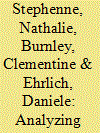

|
|
|
|
|
| Publication |
2009.
|
| Summary/Abstract |
The objective of this literature review is to understand where Graphical Information Systems (GIS) can be useful to address security issues and how it has been used until now. While the geographic drivers of territorial conflicts have been extensively described by a number of political studies, the quantitative analysis of these drivers is quite new. This study traces an evolution from conceptual research to quantitative development. It then discusses the advantages and challenges of applying new geographic techniques to analyze spatial drivers of conflict. We identify the main spatial components in conflict and security, the existing types of information/data and the quantitative methods used. We describe the spatial component of security by looking at: (i) the main sociopolitical concepts linked to territory, (ii) the kind of geographic concepts linked to territory, (iii) measures used to describe such geographic concepts; and (iv) the issues raised in any attempt to integrate geographic concepts into a GIS. We conclude that GIS tools can be useful in the analysis of civil disputes, particularly where subnational level data exists. This paper shows that spatial processing tools in GIS allow us to represent some spatial components and to address new issues such as the fuzzy complexity of border permeability.
|
|
|
|
|
|
|
|
|
|
|
|
|
|
|
|
| 2 |
ID:
162766
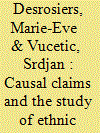

|
|
|
|
|
| Summary/Abstract |
What does causation mean in conflict studies? Using a sample of published qualitative, article-length studies on the Rwandan and Yugoslav wars, this article finds a lack of reflexivity over causal claims in scholarship on conflict. Causal language is not as pervasive as expected, asserted cause-effect relationships are rarely fully explicated, and scholars under-explore their causal assumptions. Considering that ideas on causation necessarily condition explanations of conflict, including “ethnic” conflict, this is a major research issue. While there exists a lively debate between different causal narratives regarding the onset of conflict—with studies alternatively stressing “attitudes,” “conditions,” or both—it stops short of addressing issues at the deeper level of causal understandings. For the most part, studies subscribe to the search for empirical generalization, thus limiting attendant debates to a single model of causation. These findings indicate that conflict studies literature would benefit from greater reflexivity and pluralism with regards to causation and paying more attention to philosophical debates on the subject. The article provides a basic outline of this reflexive agenda.
|
|
|
|
|
|
|
|
|
|
|
|
|
|
|
|
| 3 |
ID:
152098
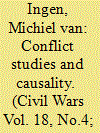

|
|
|
|
|
| Summary/Abstract |
he study of civil war has increased exponentially during the post-cold war period. This has not, however, resulted in greater levels of consensus with regard to the causes and nature of this phenomenon. In order to alleviate this situation the current article will draw on critical realist philosophy. It will argue (1) that critical realism provides conflict studies authors with a more sophisticated and coherent understanding of causality than has previously been available to them, and (2) that this understanding paves the way for an approach to social science which – rather than consistently abstracting from context – systematically engages with it.
|
|
|
|
|
|
|
|
|
|
|
|
|
|
|
|
| 4 |
ID:
098306
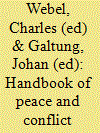

|
|
|
|
|
| Publication |
London, Routledge, 2010.
|
| Description |
xv, 406p.
|
| Standard Number |
9780415483193
|
|
|
|
|
|
|
|
|
|
|
|
Copies: C:1/I:0,R:0,Q:0
Circulation
| Accession# | Call# | Current Location | Status | Policy | Location |
| 055195 | 303.66/WEB 055195 | Main | On Shelf | General | |
|
|
|
|
| 5 |
ID:
046250
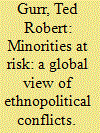

|
|
|
|
|
| Publication |
Washington, D. C., United States Institute of Peace Press, 1998.
|
| Description |
xii, 427p.
|
| Standard Number |
0878379240
|
|
|
|
|
|
|
|
|
|
|
|
Copies: C:2/I:0,R:0,Q:0
Circulation
| Accession# | Call# | Current Location | Status | Policy | Location |
| 045903 | 305.8/GUR 045903 | Main | On Shelf | General | |
| 046163 | 305.8/GUR 046163 | Main | On Shelf | General | |
|
|
|
|
| 6 |
ID:
166768
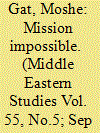

|
|
|
|
|
| Summary/Abstract |
Since entering office, William Rogers had undertaken to advance the peace process between Israel and the Arab states, particularly Egypt. He believed an agreement would serve the American interests at a time when extremism was spreading in the Arab world, and Soviet influence had grown. However, his actions on the political front went unsupported by President Nixon. Moreover, the National Security Advisor had embraced a different policy vis à vis Israel and the Arab world. Rogers' failure to secure an interim agreement and his previous failure to persuade Israel and Egypt to accept his plan, led the entire region back to stagnation, from which it emerged only after the October 1973 Yom Kippur War.
|
|
|
|
|
|
|
|
|
|
|
|
|
|
|
|
| 7 |
ID:
104629
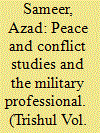

|
|
|
| 8 |
ID:
165324
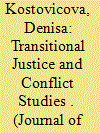

|
|
|
|
|
| Summary/Abstract |
This article identifies three aspects of conflict studies that are largely ignored in the transitional justice literature: debates over the causes of armed conflict, the transnational nature of contemporary violence, and the persistence of wartime actors and structures. It analyzes scholarly attempts that begin to bridge the divide between transitional justice and conflict studies. Those efforts demonstrate how engagement with conflict studies can open new research horizons in the study of transitional justice and lead to better understandings of how justice-focused interventions can bring about positive peace. However, innovation in primary data generation and methods is needed for this subfield to develop into a fully-fledged research program.
|
|
|
|
|
|
|
|
|
|
|
|
|
|
|
|
| 9 |
ID:
184084
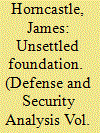

|
|
|
|
|
| Summary/Abstract |
Whilst scholars have examined the long-term political, social, and cultural dynamics with regards to Yugoslavia’s collapse, the military has largely escaped similar scrutiny. This paper explores the League of Communists of Yugoslavia’s attempt to solve the nationalist problems of Yugoslavia through the ideology of self-management, and how the failure to do so affected the strategy of Total National Defence. The republics were able to construct their own armed forces due to Total National Defence’s devolution of powers and self-management making changes to the policy extremely difficult for the federal government and Yugoslav People’s Army.
|
|
|
|
|
|
|
|
|
|
|
|
|
|
|
|
| 10 |
ID:
182446
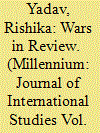

|
|
|
|
|
| Summary/Abstract |
This essay reviews four disparate studies on war narratives: ‘Right to Mourn’ by Suhi Choi (2019), ‘Fly Until You Die’ by Chia Youyee Vang (2019), ‘Soldiers in Revolt’ by Maggie Dwyer (2018), ‘Breaking the Binaries in Security Studies’ by Ayelet Harel-Shalev and Shir Daphna-Tekoah (2019). The studies take a ‘view-from-below’ approach and build new theoretical frameworks that not only expose ‘the price of war’, but also investigate how ‘subaltern subjects’ subjects view their place and participation in the conflict and resist over-arching homogenous interpretations. The studies respectively focus on post-war remembrance in South Korea, oral histories of Hmong pilots, mutinying in West African states, and the experiences of female combatants in the Israeli Defence Forces. Although dissimilar in terms of geographic spaces, actors and even methodology, the authors all commonly challenge established binaries within conflict studies that assume a separation of the ‘military’ and the ‘civilian’, the prevalence of power-hierarchies within armed forces, and the supposed passiveness of powerless actors in conflict. This essay reviews these books as not individual publications that contribute to the literature of their own disciplines, but as interactive theoretical frameworks that not only dispute prevailing theories of war but also present new understandings on how these narratives interrelate.
|
|
|
|
|
|
|
|
|
|
|
|
|
|
|
|
| 11 |
ID:
177731
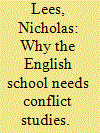

|
|
|
|
|
| Summary/Abstract |
The English School tradition offers a compelling framework for understanding war as an institution within an international society constructed by states. Nonetheless, analyses of the causes of inter-state insecurity offered by English School scholars are underspecified and fail to develop distinct middle-range theories based on these core insights. These problems can be remedied through an engagement with the subfield of quantitative conflict studies. This pairing of ‘scientific’ and ‘classical’ research traditions seems improbable, but the methodological barriers to conversation can be overcome if claims about the circumstances and causes of war are contextualised historically. Important findings in conflict research vindicate the English School understanding of war as a social institution of an anarchical society and a norm-governed mechanism for resolving disputes between political entities. Further dialogue between these approaches would deepen our understanding of how the global institutional landscape shapes both war and peace.
|
|
|
|
|
|
|
|
|
|
|
|
|
|
|
|
|
|
|
|
|